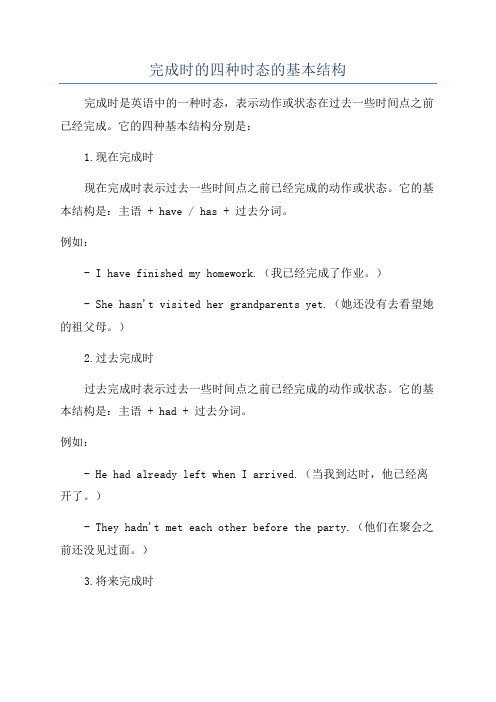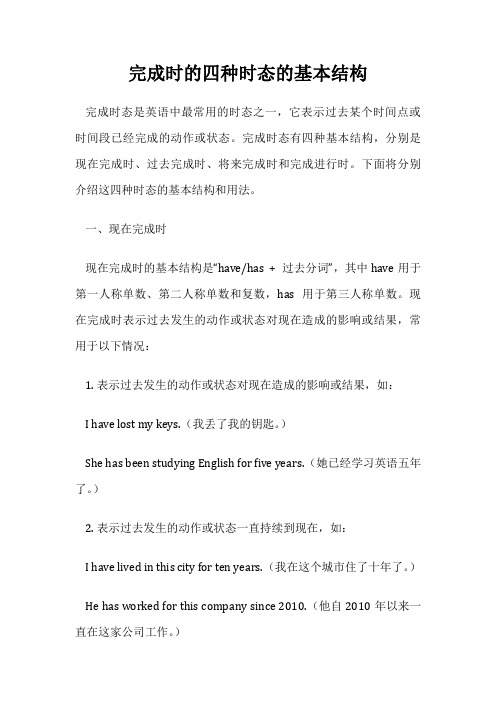初一英语四种基本时态
- 格式:doc
- 大小:63.00 KB
- 文档页数:12

四种基本时态总结在英语语法中,时态是指表示动作发生的时间的一种语法形式。
英语中有4种基本时态:简单过去时、简单现在时、简单将来时和现在完整时。
此文将简单总结这四种基本时态的用法和表示的时间。
简单过去时 (Simple Past)简单过去时表示已经完成的过去的动作或状态。
在句子中,过去式的动词通常有-ed的结尾,但也有一些例外。
例如,“be”在过去式下变成“was”或“were”。
用法:过去完成的动作She ate breakfast at 7过去发生的事情We saw that movie last night过去的习惯I always drank tea in the afternoon简单现在时 (Simple Present)简单现在时描述现在正在发生的事情或现在的状态。
在第三人称单数主语的情况下,动词以-s结尾。
用法:现在的习惯I usually drink tea in the afternoon存在状态She lives in Canada普遍事实The world is round描述事情The movie starts at 6简单将来时 (Simple Future)简单将来时用于表示将来某个时间会发生的事情。
可以使用情态助动词will 和shall加上动词原形,也可以使用动词原形来表示未来。
用法:趋势I think gasoline prices will go up.决定或意愿I’ll help you with that homework after dinner在特定的时间或时间段内发生I’ll finish my homework by 9 PM现在完成时 (Present Perfect)现在完成时通常用于强调过去发生的事情与现在的联系。
它与简单过去时明显不同,因为它包括从过去开始,延续到现在或在过去一点时间内的动作或状态。
在句子中,现在完成时通常使用have或has和动词的过去分词。

初中英语时态归纳
初中英语时态主要包括一般现在时、现在进行时、一般过去时和一般将来时。
1. 一般现在时:表示经常性或习惯性动作,常与表示频度的时间状语连用,如always, usually, often, sometimes, every week (day, year, month…), once a week, on Sundays等。
基本结构是be动词(am/is/are)+动词原形。
否定形式是在be动词后加not,疑问句则把be动词放在句首。
2. 现在进行时:表示现阶段或说话时正在进行的动作及行为,常与now, at present, these days等时间状语连用。
基本结构是be 动词+动词的现在分词。
疑问句则把be动词放在句首。
3. 一般过去时:表示过去某个时间里发生的动作或状态,也表示过去习惯性、经常性的动作、行为。
常与表示过去的时间状语连用,如yesterday, last night, the other day等。
基本结构是be动词的过去式或行为动词的过去式。
4. 一般将来时:表示将来要发生的动作或状态,也表示将来经常或反复发生的动作,常与tomorrow, next year等时间状语连用。
基本结构是be动词的将来式或行为动词的将来式。
此外,还有现在完成时和过去完成时等时态。
如需更多信息,建议查阅英语语法书籍或咨询英语老师。

完成时的四种时态的基本结构完成时是英语中的一种时态,表示动作或状态在过去一些时间点之前已经完成。
它的四种基本结构分别是:1.现在完成时现在完成时表示过去一些时间点之前已经完成的动作或状态。
它的基本结构是:主语 + have / has + 过去分词。
例如:- I have finished my homework.(我已经完成了作业。
)- She hasn't visited her grandparents yet.(她还没有去看望她的祖父母。
)2.过去完成时过去完成时表示过去一些时间点之前已经完成的动作或状态。
它的基本结构是:主语 + had + 过去分词。
例如:- He had already left when I arrived.(当我到达时,他已经离开了。
)- They hadn't met each other before the party.(他们在聚会之前还没见过面。
)3.将来完成时将来完成时表示将来一些时间点之前已经完成的动作或状态。
它的基本结构是:主语 + will / shall + have + 过去分词。
例如:- By next week, I will have finished this project.(到下周,我会完成这个项目。
)4.过去将来完成时过去将来完成时表示在过去一些时间点之前将要完成的动作或状态。
它的基本结构是:主语 + would / should + have + 过去分词。
例如:- She said she would have finished the report by yesterday.(她说她应该在昨天之前完成这份报告。
)- He promised he should have paid the bill before leaving.(他承诺在离开之前应该付清账单。
)。

完成时的四种时态的基本结构完成时态是英语中最常用的时态之一,它表示过去某个时间点或时间段已经完成的动作或状态。
完成时态有四种基本结构,分别是现在完成时、过去完成时、将来完成时和完成进行时。
下面将分别介绍这四种时态的基本结构和用法。
一、现在完成时现在完成时的基本结构是“have/has + 过去分词”,其中have用于第一人称单数、第二人称单数和复数,has用于第三人称单数。
现在完成时表示过去发生的动作或状态对现在造成的影响或结果,常用于以下情况:1. 表示过去发生的动作或状态对现在造成的影响或结果,如:I have lost my keys.(我丢了我的钥匙。
)She has been studying English for five years.(她已经学习英语五年了。
)2. 表示过去发生的动作或状态一直持续到现在,如:I have lived in this city for ten years.(我在这个城市住了十年了。
) He has worked for this company since 2010.(他自2010年以来一直在这家公司工作。
)3. 表示过去发生的动作或状态与现在有关联,如:I have just finished my homework.(我刚刚完成了我的作业。
)She has already left for the airport.(她已经去机场了。
)二、过去完成时过去完成时的基本结构是“had + 过去分词”,表示在过去某个时间点或时间段之前已经完成的动作或状态。
过去完成时常用于以下情况:1. 表示过去某个时间点或时间段之前已经完成的动作或状态,如:I had finished my work before he arrived.(他到达之前我已经完成了我的工作。
)She had lived in Paris for two years before she moved to London.(她在搬到伦敦之前在巴黎住了两年。

四大时态句型结构一、一般现在时: 经常或习惯性的动作(1) 含有be动词的句型肯定句——主语+be (am, is, are ) + 其他. eg: I am Chinese.否定句——主语+be not +其他. eg: I am not a boy.一般疑问句——Be+主语+其他. eg: Are you a girl?特殊疑问句——特殊疑问词+be (am, is, are )+主语+其他?eg:Why is your Mum so angry? What’s your name? How old are you? (2) 含有实意动词的句型肯定句——主语+动原+其他. (单三人称作主语时,动词要用相应的单三人称形式。
) eg: I (He) often get (gets) up early.否定句——主语+don't+动原+其他. (单三人称作主语时,don't变doesn't。
) eg: I (She) don’t (doesn’t) like him.一般疑问句——DO+主语+动原+其他. (单三作主语时,do变does)eg: Do (Does) you (she) like playing basketball?特殊疑问句——特殊疑问词+助动词(do或does)+主语+动词原形+其他?eg:Where do you study English? What do you do ?(3) 含有情态动词can的句型(只要遇见can,无论主语是什么人称,动词一律用原型。
)肯定句——主语+can+动原+其他. eg:I(She)can swim.否定句——主语+can't(can not)+动原+其他. eg: I (They) can't speak English.一般疑问句——Can+主语+动原+其他. eg: Can you (he) see the bird in the tree?特殊疑问句——特殊疑问词+情态动词(can)+主语+动词原形+其他?eg:What can I do for you?关键词: sometimes=at times有时,often经常, usually通常, always总是,every day每天, on Sunday afternoon在周日下午, five days a week一周五天, three times a month一个月三次…二、现在进行时: 正在发生的动作或存在的状态肯定句——主语+be+动词的现在分词(ing)+其他. eg: I am reading now.否定句——主语+be not+动词的现在分词(ing)+其他. eg: I am not working.一般疑问句——Be +主语+动词的现在分词(ing)+其他? eg: Are you sleeping?特殊疑问句——特殊疑问词+ be +主语+动词的现在分词(ing)+其他?eg:What are you doing?关键词:now现在, at the moment此刻, look, listen, keep quiet等提示语.三、一般将来时: 将要发生的动作(1)含有will的句型肯定句——主语+will+动词原型+其他. eg: I will call you later.否定句——主语+will not +动词原型+其他. eg: I will not go to the park.一般疑问句——Will +主语+动词原型+其他. Will you go shopping with her?特殊疑问句——特殊疑问词+will +主语+动词原形+其它?(will 可改为be going to ,疑问句中当主语是第一人称时will改为shall)(2)含有be going to 的句型肯定句——主语+be(am / is / are) + going to +动词原形+其它.否定句——主语+be(am / is / are)+not + going to +动词原形+其它.一般疑问句——Be(am / is / are) +主语+ going to +动词原形+其它?特殊疑问句——特殊疑问词+ be(am / is / are) +主语+ going to +动词原形+其它?关键词:tomorrow, next year明年, tonight今晚, this year今年, at the end of this term这学期期末, from now on从现在开始, soon一会儿马上, later后稍后,in three days三天之内, in the future未来…四、一般过去时: 过去发生的动作强调时间(1)含有be动词的句型肯定句——主语+be(was,were)+其他. eg: I was born on July.1st, 2000.否定句——主语+be(was,were) not+其他. eg: I was not born in 1999.一般疑问句—Be(was,were)+主语+其他? eg: Were you born in January?特殊疑问句—特殊疑问词+ be(was,were)+主语+其他. eg: When was he born?(2)含有实意动词过去式的句型肯定句——主语+动词的过去式+其他. eg: Lily went shopping yesterday.否定句——主语+did not+动原+其他. eg: He did not go to school today.一般疑问句——Did+主语+动原+其他? eg:Did she pass the test?特殊疑问句—特殊疑问词+did+主语+动原+其他. eg:Where did you go yesterday?关键词:yesterday昨天,last week上周, last year去年, 一段时间+ago如ten years ago十年前five hours ago五小时前, in +年/月,on+具体日期...Just now=a moment ago刚才,in the old days从前, long ago很久以前...。

四种常用时态1.一般现在时(1)表示经常发生的动作或事情。
标志词:usually, often, every day, sometimes,always, never (2)基本结构:I / You / We / They He / She / It +…肯定句直接+动词原形动词第三人称单数形式例句:I often go swimming in summer.否定句+don’t + 动词或者+doesn’t + 动词原形例句:I don’t like ice-cream in winter at all.一般疑问句Do… ? Yes, I do.Does…(动词原形)…?No,she doesn’t.特殊疑问句What do …? How does she…(动词原形)…?(3) 动词第三人称单数形式①. 大多数动词+s walk-walks②. 以辅音字母+y结尾的动词去y+ies fly-flies③. 以s, sh, ch or x 结尾的动词+es watch-watches④. 不规则变化do-does ,have-has, go-goes 2.现在进行时(1)表示正在发生的动作。
标志词:now, look(2)基本形式:be + 动词+ing例句: I am(not) doing my homework.You/We/They are(not) reading.He/She/It is(not) eating.What are you doing?Is he reading?(3)动词的现在分词形式(do+ing)①. 大多数动词+ing walk—walking②. 以e结尾的动词去e+ing come—coming③. 重读闭音节单词,末尾只有一个辅音字母双写最后一个辅音字母再+ing run-running swim-swimming 3. 一般过去时态(1)表示过去已经发生的事情。
初中英语必备常见时态解析与用法总结在学习英语的过程中,掌握各种时态的用法是至关重要的。
本文将为大家详细解析初中英语中常见的时态,并总结它们的用法,帮助大家更好地理解和运用。
一、现在时态(SimplePresentTense)现在时态表示目前的状态、习惯性动作或真理。
一般情况下,现在时态的动词不加“-s”或“-es”。
例句:IplayfootballeverySunday.(我每个星期天都踢足球。
)Waterboilsat100degreesCelsius.(水在100摄氏度时沸腾。
)二、过去时态(SimplePastTense)过去时态用来表示过去发生的动作或状态。
大多数动词在过去时态下加上了“-ed”。
例句:ShevisitedParislastsummer.(她去年夏天参观了巴黎。
)Theyplayedbasketballyesterday.(他们昨天打篮球了。
)三、将来时态(SimpleFutureTense)将来时态表示将来要发生的动作或状态。
常用的表达方式是使用助动词“will”。
例句:Iwillgoshoppingtomorrow.(我明天要去购物。
)Shewillstudyhardfortheexam.(她将为考试努力学习。
)四、现在进行时态(PresentContinuousTense)现在进行时态表示现在正在进行的动作。
构成方式为“主语+am/is/are+现在分词”。
例句:Theyareplayingsoccerinthepark.(他们正在公园里踢足球。
)Sheisreadingabookrightnow.(她现在正在看书。
)五、过去进行时态(PastContinuousTense)过去进行时态表示过去某一时刻正在进行的动作。
构成方式为“was/were+现在分词”。
例句:Iwasstudyingwhenthephonerang.(电话响时我正在学习。
)Theywereplayingchessatthattime.(他们那时在下国际象棋。
初中英语四种时态归纳总结小学,初中英语包含八大时态,今天小编就为大家整理初中英语四种时态归纳,希望对大家有所帮助,一起来看看吧!初中英语四种时态归纳一、一般现在时:概念:经常、反复发生的动作或行为及现在的某种状况。
时间状语: always, usually, often, sometimes, every week (day, year, month…), once a week, on Sundays基本结构:① be 动词;②实义动词否定形式:① am/is/are+not; ②谓语动词若为实义动词,A.主语不是三单式,则don't+动词原形B.主语为三单式,则doesn't+动词原形。
一般疑问句:①把 be 动词放于句首;②谓语动词若为实义动词,A.主语不是三单式,用助动词 Do+主语+动词原形B.主语为三单式,则Does+主语+动词原形Helen ________ a good student.(be)Helen ________ fishing very much.(like)Helen’s friends usually ________ to school by bike.(go)二、一般过去时:概念:过去某个时间里发生的动作或状态;过去习惯性、经常性的动作、行为。
时间状语:…ago, yesterday, the day before yesterday, last week(year, night, month…), in 1989, just now, at the age of 5, one day, at last, in the end, finally, at first基本结构:①was/were;②实义动词的过去式(dodid, comecame, stopstopped)否定形式:①was/were+not; ②在实义动词前加didn't ,同时还原实义动词,即didn’t+动词原形一般疑问句:① was 或 were 放于句首;②用助动词 do 的过去式did 提问,同时还原实义动词。
初中人教英语时态一、现在一般时现在一般时表示现在时刻发生的动作或存在的状态。
其基本结构是“主语+谓语+宾语”,例如:I eat an apple every day.二、过去一般时过去一般时表示过去某个时间发生的动作或存在的状态。
其基本结构是“主语+谓语+宾语”,例如:She studied English last year.三、将来一般时将来一般时表示将来某个时间发生的动作或存在的状态。
其基本结构是“主语+will+谓语+宾语”,例如:He will visit his grandparents next week.四、现在进行时现在进行时表示现在正在进行的动作。
其基本结构是“主语+be 动词+谓语动词-ing”,例如:They are playing basketball now.五、过去进行时过去进行时表示过去某个时间正在进行的动作。
其基本结构是“主语+was/were+谓语动词-ing”,例如:They were having dinner at 6 o’clock yesterday.六、将来进行时将来进行时表示将来某个时间正在进行的动作。
其基本结构是“主语+will be+谓语动词-ing”,例如:They will be studying in the library next week.七、现在完成时现在完成时表示过去发生的动作或存在的状态,对现在造成的影响或结果。
其基本结构是“主语+have/has+谓语动词过去分词”,例如:I have finished my homework.八、过去完成时过去完成时表示过去的某个时间点之前已经完成的动作。
其基本结构是“主语+had+谓语动词过去分词”,例如:She had written a letter before she went to bed.。
英语四种时态总结英语有四种基本时态:一般现在时(Simple Present)、一般过去时(Simple Past)、一般将来时(Simple Future)、现在进行时(Present Continuous)。
1. 一般现在时(Simple Present):主要用于描述现在的状态、习惯、经常性的动作或普遍真理。
句子结构为主语+动词原形(也可在第三人称单数加上-s或-es)。
例句:- I play soccer every weekend.(我每个周末踢足球。
)- He goes to bed early.(他早睡。
)- The sun rises in the east.(太阳从东方升起。
)2. 一般过去时(Simple Past):主要用于描述过去发生的事情或状态。
句子结构为主语+动词过去式。
例句:- She studied English in high school.(她在高中学习英语。
)- We visited London last year.(我们去年参观了伦敦。
)- They ate dinner at a fancy restaurant.(他们在一家高档餐厅吃晚餐。
)3. 一般将来时(Simple Future):主要用于描述将来会发生的动作或事件。
句子结构为主语+will+动词原形。
例句:- I will go to the gym tomorrow.(我明天会去健身房。
)- She will take the exam next week.(她下周会参加考试。
)- We will have a party on Friday.(我们星期五会举办一场派对。
)4. 现在进行时(Present Continuous):主要用于描述当前正在进行的动作。
句子结构为主语+be动词(am/is/are)+动词的ing形式。
例句:- They are watching a movie now.(他们正在看电影。
请浏览后下载,资料供参考,期待您的好评与关注! 初一英语四种基本时态复习 一、 一般现在时 一般现在时的用法
1) 经常性或习惯性的动作,常与表示频腮度的时间状语连用。时间状语: every…, sometimes, at…, on Sunday。例如: I leave home for school at 7 every morning. 每天早上我七点离开家。
2) 客观真理,客观存在,科学事实。例如: The earth moves around the sun. 地球绕太阳转动。 Shanghai lies in the east of China. 上海位于中国东部。 3) 表示格言或警句。例如: Pride goes before a fall. 骄者必败。 注意:此用法如果出现在宾语从句中,即使主句是过去时,从句谓语也要用一般现在时。
例:Columbus proved that the earth is round. 哥伦布证实了地球是圆的。 4) 现在时刻的状态、能力、性格、个性。例如: I don't want so much. 我不要那么多。 Ann writes good English but does not speak well. 安英语写得不错,讲的可不行。
课堂小测 1. We often______(play) in the playgound. 2. He _____(get) up at six o’clock. 3. _____you ______(brush) your teeth every morning. 4. What (do) ______he usually (do)______ after school? 5. Danny _____(study) English,Chinese,Maths,Science and Art an school.
6. Mike sometimes ________(go) to the park with his sister. 请浏览后下载,资料供参考,期待您的好评与关注!
7. At eight at night, she __________(watch) TV with his parents. 8. ________ Mike________(read) English every day? 9. How many lessons_________your classmate________(have) on Monday? 10. What time_________his mother_________(do) the housework? 改句子 1. Do you often play football after school? (肯定回答)
2. Gao Shan’s sister likes playing table tennis (改为否定句) 3. She lives in a small town near New York. (改为一般疑问句) 4. We have four lessons.(否定句) 5. Nancy doesn’t run fast (肯定句) 6. Mike has two letters for him. 一般疑问句: 否定句: 7. I usually play football on Friday afternoon. 否定句: 一般疑问句: 划线提问 8. Tom does his homework at home. 否定句: 一般疑问句: 划线提问
二、 一般过去时 一般过去时的基本用法: 1. 通常表示过去发生的而现在已经结束的事件、动作或情况。 Eg. Sam phoned a moment ago.
2. 还可以表示刚刚发生的事情而没说明时间。 Eg. Did the telephone ring?
3. 也可以表示过去的习惯性动作。 Eg. I smoked 40 cigarettes a day till I gave up.
(二)与一般过去时连用的时间状语: 请浏览后下载,资料供参考,期待您的好评与关注!
yesterday, last week/Sunday/year, …ago, just now… eg. I met Lily yesterday.
He had dinner just now. (三)一般过去时的构成: 1. 有be的句子。 am/is—was are—were eg.肯定句:He was a cook 2 years ago. They were at school yesterday. 否定句:He was not a cook 2 years ago. They were not at school yesterday. 一般疑问句:Was he a cook 2 years ago? Yes, he was. No, he wasn’t. Were they at school yesterday? Yes, they were. No, they weren’t
课堂小测 一、单项选择: 从下列各题后所给的四个选项中选择最佳答案填空。(10) ( ) 1. My father______ill yesterday. A. isn't B. aren't C. wasn't D. weren't ( ) 2. ______your parents at home last week﹖ A. Is B. Was C. Are D. Were ( ) 3. The twins______in Dalian last year. They______here now. A. are; were B. were; are C. was; are D. were ; was ( ) 4. ______your father at work the day___yesterday(前天)﹖ A. Was; before B. Is; before C. Was; after D. Is; after ( ) 5. —Who was on duty last Friday﹖ —______. A. I am B. I was C. Yes, I was D. No, I wasn't ( ) 6. I cleaned my classroom ___________. A with three hours B three hours ago C in three hours D three hours before ( ) 7. I came _______ my house two days ago . A back on B back to C to back D back ( ) 8 . ___________? He did some reading at home. A What does your father do yesterday evening B What does your brother do in the school C What did your brother do over the weekend 请浏览后下载,资料供参考,期待您的好评与关注!
D Where did your brother go last Sunday ( ) 9. What did you do ________ ? I went to the movies. A next morning B over the weekend C in the weekend D next Monday ( ) 10. The koala sleeps _______,but gets up _________. A during the day; at the evening B at day ; during night C in the day ; during the evening D during the day ; at night
二、请用正确动词形式填空。(10) 1. I _________ (have) an exciting party last weekend. 2. _________ she _______(practice) her guitar yesterday? No, she _________. 3. What ________ Tom ________ (do) on Saturday evening? He ________ (watch) TV and __________(read) an interesting book. 4. They all _________ (go) to the mountains yesterday morning. 5. She _________ (not visit) her aunt last weekend. She ________ (stay) at home and _________(do) some cleaning. 6. When _______ you ________ (write) this song? I ________(write) it last year. 7. My friend, Carol, _______ (study) for the math test and _______(practice) English last night. 8. ________ Mr. Li __________(do) the project on Monday morning? Yes, he _________. 9. How _________(be) Jim's weekend? It _________ (be not) bad. 10. ________ (be) your mother a sales assistant last year? No. she __________.
三、 改错题(20) 1.How is Jane yesterday? _____________________ 2.He go to school by bus last week. ____________________________ 3.He often goes home at 6:00 last month. ____________________________ 4.I can fly kites seven years ago. ______________________________ 5.Did you saw him just now. ____________________________________ 6.Tom wasn’t watch TV last night. ____________________________________ 7.I didn’t my homework yesterday. ____________________________________ 8.He wait for you three hours ago. ____________________________________ 9.Who find it just now ? ________________________________________ 10.What make him cry (哭) just now? __________________________________